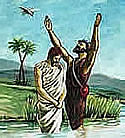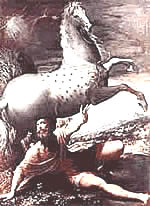 St Mary's Church, Dymock
St Mary's Church, Dymock
| Admin | |||
| . | Home | Contents | |
| H&S Policy | People Safety | Grave Yard | |
The Church & The World
Faith & Care
Faith & Care
Things Past
People & Features
People & Features
Seasons and Festivals

As well as the Seasons and Major Festivals, the church celebrates several 'Special Days' throughout the year to remember, honour or support our work in God's world. Celebration of the Special Days is usually optional, Christians chose which they want to include. Click here to view the 'Special Days'.

Visit of the Wise Men

.
It's usual to talk about the 'three wise men' but the Bible doesn't say how many there were, it only mentions three gifts - gold, frankincense and myrrh (Matthew 2:1 & 2:11), but people have assumed that as there were three gifts, so there must have been three wise men, although there could have been more or less men. (Return to top)
The Baptism of Jesus

Conversion of Saint Paul

.
Despite his previous impassioned persecution of Christians, Paul now became a Christian himself and one of the main people to spread the knowledge of Jesus, and hence Christianity, throughout the rest of the world (Acts, chapter 9). Paul now saw his task was to make Jesus known to non-Jews, so he visited many of the countries around the area and wrote many of the letters now included in the latter part of the Bible. (Return to Top)